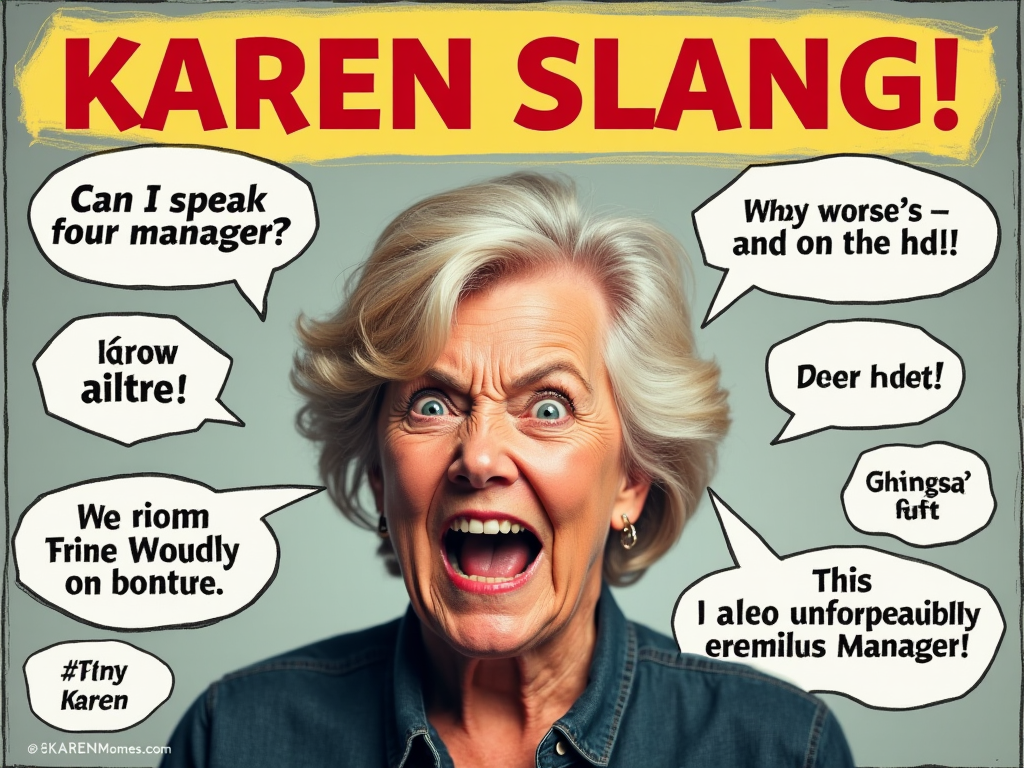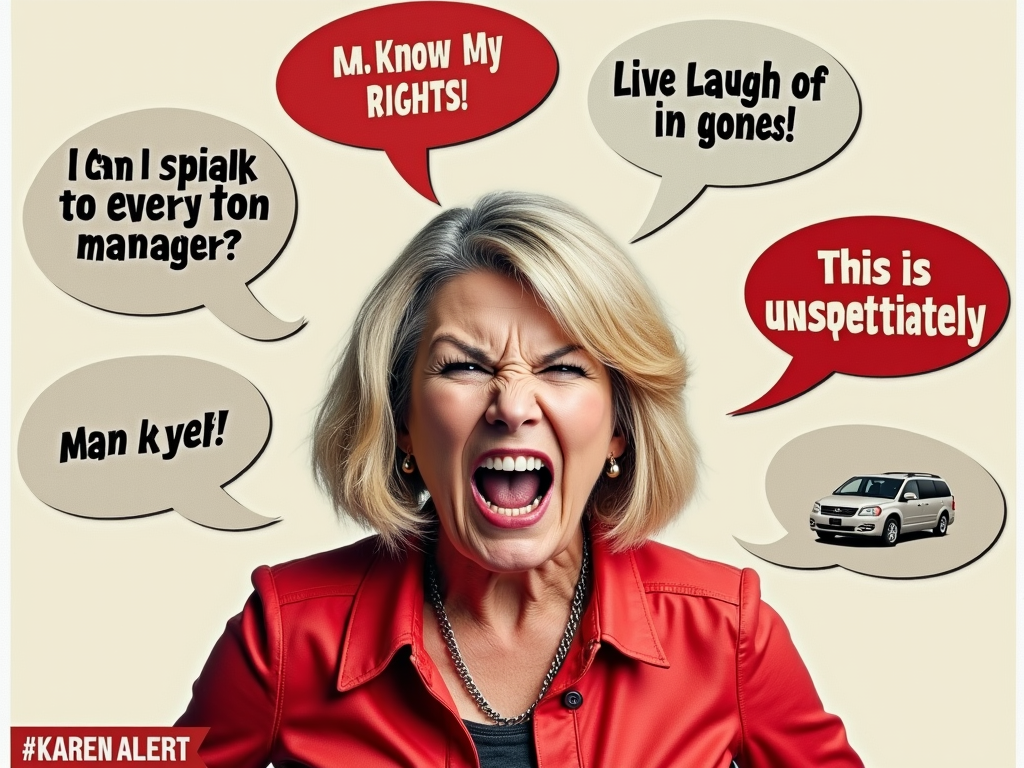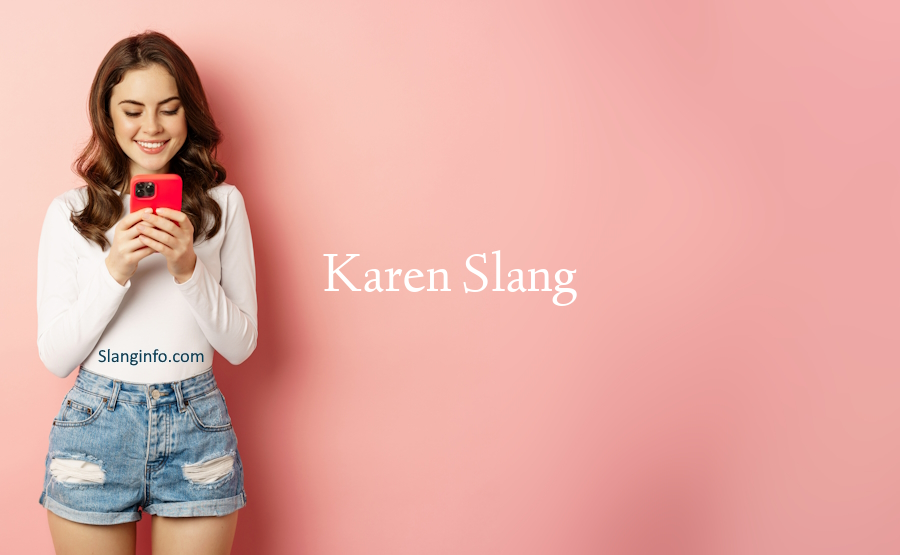Hey there, internet explorers and slang enthusiasts! 👋 Ever scrolled through social media and stumbled upon the term “Karen” being thrown around like confetti at a party? Well, buckle up, because we’re about to dive deep into this spicy slice of modern slang that’s got everyone talking (and some people fuming). 😤
| Key Takeaways |
|---|
| 1. “Karen” is a disparaging term for entitled, privileged white women |
| 2. The term originated in Black American communities to call out racist behavior |
| 3. It gained widespread popularity through social media and memes in the late 2010s |
| 4. The use of “Karen” has been criticized as sexist, ageist, and seeking to control women’s behavior |

What Does “Karen” Mean? 🤔
Alright, let’s break it down. In the world of slang, a “Karen” isn’t just your aunt’s name or that nice lady who bakes cookies for the neighborhood kids. Nope, it’s a term used to describe a specific type of person – usually a middle-aged white woman – who’s seen as entitled, demanding, and often racist.
Think of it as a shorthand for someone who:
- Demands to speak to the manager over the tiniest inconvenience 📢
- Calls the cops on people of color for simply existing in public spaces 👮♀️
- Throws a fit when things don’t go exactly their way 😡
- Sports a particular short, angled haircut (you know the one) 💇♀️
It’s like the human embodiment of the phrase “the customer is always right,” but taken to the extreme.
Origins of the “Karen” Slang Term 📚

Now, you might be wondering, “Where did this term come from?” Well, it’s got a pretty interesting history. The use of “Karen” as a slang term didn’t just pop up overnight like a yeet in the night.
The term has its roots in Black American communities, where it was used to call out racist and entitled behavior from white women. It’s like a modern version of “Miss Ann,” a term used during the civil rights era to describe white women who used their privilege to oppress Black people.
But how did it go mainstream? Well, we can thank the internet for that. Memes, social media posts, and viral videos featuring “Karen” behavior started popping up in the late 2010s, and before you knew it, “Karen” was everywhere.
Some folks point to a 2005 Dane Cook comedy bit about a friend named Karen being “always a douchebag” as an early pop culture reference. Others link it to the character Karen Smith from the movie “Mean Girls.” But regardless of its exact origin, “Karen” really took off in the digital age.
Examples of “Karen” Behavior 🗣️
So, what exactly does a “Karen” do? Here are some classic examples:
- The Manager Summoner: This Karen’s catchphrase is “I want to speak to the manager!” She’ll use it for everything from a slightly cold latte to a coupon that expired yesterday.
- The Park Patrol: This Karen calls the cops on Black people having a barbecue in a public park, claiming they’re “disturbing the peace.”
- The Mask Maverick: During the COVID-19 pandemic, this Karen refused to wear a mask in stores, claiming it violated her rights.
- The Neighborhood Watch: This Karen posts on Nextdoor about “suspicious” people (usually people of color) walking down the street.
- The Coupon Queen: This Karen holds up the entire checkout line arguing over a 50-cent coupon, insisting the cashier is wrong.
These behaviors have led to some infamous “Karens” getting their own nicknames. Remember “BBQ Becky” who called the cops on Black people barbecuing in Oakland? Or “Permit Patty” who called the police on an 8-year-old Black girl selling water? Yep, classic Karen moves.
The Controversy Surrounding “Karen” 🔥

Now, here’s where things get a bit sticky. While many people use “Karen” as a way to call out problematic behavior, others argue that the term itself is problematic. It’s like opening a can of worms, but the worms are actually heated debates about sexism, ageism, and racism.
Some folks say that “Karen” is:
- Sexist: Because it’s primarily used to describe women
- Ageist: Since it often refers to middle-aged or older women
- Classist: As it’s associated with a certain socioeconomic status
- Racist: Ironically, some argue it’s racist against white people
Others argue that “Karen” is a valid way to address systemic racism and privilege. They say it’s not about targeting all white women, but specifically calling out those who use their privilege to harm others.
It’s a complex issue, and there’s no easy answer. Like many slang terms, “Karen” carries a lot of weight and can mean different things to different people.
“Karen” in Popular Culture 📺
Love it or hate it, there’s no denying that “Karen” has made a big splash in popular culture. It’s like the slang term that launched a thousand memes. 🚀
You can’t scroll through social media without seeing a “Karen” joke or reference. There are entire subreddits and Twitter accounts dedicated to sharing “Karen” stories and memes. It’s like a never-ending roast of entitled behavior.
Even mainstream media has gotten in on the action. News articles about “Karen” incidents go viral, and TV shows and movies have started including “Karen” characters. It’s like “Karen” has become a cultural shorthand for a specific type of person.
Some companies have even tried to capitalize on the trend. In 2020, a company called “Karen” launched a software product designed to help people report “Karen” behavior. Talk about turning lemons into lemonade! 🍋
But not everyone is laughing. Some people argue that the widespread use of “Karen” trivializes real issues of racism and privilege. They say it’s become a way to dismiss valid concerns and shut down conversations.
Alternatives to Using “Karen” 🌈
So, what’s a socially conscious slang user to do? If you’re not comfortable using “Karen,” there are other ways to address problematic behavior without relying on stereotypes.
Instead of calling someone a “Karen,” you could:
- Be specific about the behavior: “That comment was racist and inappropriate.”
- Focus on the impact: “Your actions are making people feel unsafe and unwelcome.”
- Offer constructive feedback: “I know you might not have intended it, but here’s why that joke was offensive.”
- Encourage empathy: “Try putting yourself in their shoes and understanding their perspective.”
Remember, the goal is to create positive change, not just to call people out. It’s like that old saying: you catch more flies with honey than with vinegar. 🍯
Conclusion 💡
Alright, let’s wrap this up like a burrito! 🌯 “Karen” is a complex and controversial slang term that’s taken the internet by storm. It’s used to describe entitled, privileged behavior, often from white women.
While it originated as a way for Black communities to call out racism, it’s since become a mainstream meme and cultural reference. But not everyone agrees on whether it’s a helpful or harmful term.
At the end of the day, it’s important to remember that words have power. Whether you choose to use “Karen” or not, the key is to address problematic behavior in a way that promotes understanding and positive change.
So, the next time you encounter a “Karen” in the wild (or online), take a deep breath, channel your inner zen master, and remember: we’re all just trying to navigate this crazy world together. 🌍❤️
FAQs ❓
Q: Is it okay to call someone a “Karen”?
A: It depends on the context and your relationship with the person. Some people find it offensive, so it’s best to err on the side of caution.
Q: Are all “Karens” white women?
A: While the term is most commonly associated with white women, anyone can exhibit “Karen”-like behavior.
Q: Is there a male equivalent of “Karen”?
A: Some people use terms like “Ken” or “Kevin,” but they’re not as widely used as “Karen.”
Q: Can I get in trouble for calling someone a “Karen” at work?
A: It’s best to avoid using slang terms like “Karen” in professional settings, as they could be seen as disrespectful or discriminatory.
Q: What should I do if someone calls me a “Karen”?
A: Take a moment to reflect on your behavior and see if there’s any truth to the accusation. If you feel it’s unfair, calmly explain why. Remember, getting defensive or angry will only reinforce the stereotype.
And there you have it, folks – the wild world of “Karen” slang, explained! Whether you love it, hate it, or are just plain confused by it, one thing’s for sure: “Karen” has left a big mark on our cultural landscape. So, the next time you hear someone use the term, you’ll be armed with the knowledge to navigate the conversation like a pro. 💪
Stay woke, stay kind, and remember: we’re all in this together! 🙌
Slang Cheat Sheet:







